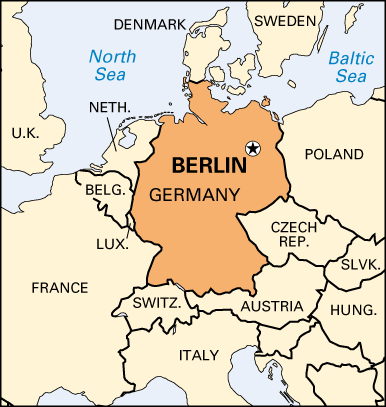Germany's East-West rift still a political hot potato
 Berlin - East and West Germany's 20-year-old political marriage came under strain at the weekend, as one of the leaders in the country's ruling coalition pondered redrafting Germany's constitution at the behest of citizens from the ex-communist East.
Berlin - East and West Germany's 20-year-old political marriage came under strain at the weekend, as one of the leaders in the country's ruling coalition pondered redrafting Germany's constitution at the behest of citizens from the ex-communist East.
With one eye doubtless on voters in the former East Germany ahead of September's general election, Social Democrat (SPD) leader Franz Muentefering suggested the country's constitution be redrafted - to take into account gripes from ex-Easterners that they were simply swallowed up by the West 20 years ago.
Germany's constitution, or "basic law", which created West Germany in 1949, has become a red-hot political issue because it was not redrawn when East and West Germany were reunified in 1990 after the collapse of the Berlin Wall.
In a weekend interview Muentefering said former East Germans, known colloquially as "Ossies", complained the West had "just slipped your basic law over us, rather than creating a joint constitution," as originally promised.
"Everything suffers from the fact that we didn't really organise a reunification in 1989-90, but added East Germany to the Federal Republic," the SPD leader told German Bild am Sonntag newspaper.
When West Germany was founded, to symbolise the temporary nature of the incomplete nation leaders agreed to implement a "basic law", to be revised and upgraded to a full constitution once all of Germany was united.
But when the Berlin Wall fell and the country was finally reunited, the basic law stayed in place, stoking East German resentment at what many saw as simply being bolted on to the existing West German state.
"Many East Germans have the feeling that we haven't always treated them equally because of the East German system," Muentefering said in Sunday's interview - stoking a chorus of criticism over a still sensitive issue in the supposedly united country.
With the Left Party, partly composed of ex-communists from the East, doing well in opinion polls, particularly in the former east, many suspected Muentefering was simply tacking left in search of votes.
Chancellor Angela Merkel's Christian Democrats (CDU) and the Liberal Free Democrats (FDP) immediately rejected any idea of revisiting the constitution.
"Muentefering is conspicuously moving close to the Left Party, if he distorts the democratic decision of the East Germans in 1990 into a form of annexation by the federal republic," said the FDP's Joerg van Essen, noting that East Germany's first democratically elected council had agreed to adopt the basic law in 1990.
The Left Party's European affairs spokesman Dieter Dehm retorted that his party "considers the basic law one of the best constitutions in the world."
Green Party representatives also said they were sceptical of Muentefering's motives for raising the issue just ahead of this year's elections.
The SPD leader also faced criticism from within his own ranks. Gesine Schwan, the SPD's presidential candidate in elections next month said, "the basic law is an excellent constitution."
"Of course we know it's always better if everyone can participate. But I think the question dates back 20 years. It is, I believe, decided now," Schwan told German state television.
Jochen Staadt, lecturer on German history at Berlin's Free University said, "from a generational perspective there are still differences between East and West."
But Staadt added that he found it hard to imagine that many former East Germans still want a new German constitution. If Muentefering were serious about changing the basic law, Staadt said, "what would he actually want to do that is different?"
This is not the first time that East-West divisions have dragged up, although the starting pistol has yet to be formally fired on the election campaign.
Last month the state premier of Mecklenburg-Western Pomerania, Erwin Sellering, provoked an outcry when he said, "I will not allow myself to condemn East Germany as a completely unjust state, in which there was not the tiniest bit of good."
Sellering, the first politician of West German origin to govern the East German state, came under attack for allegedly romanticising the former communist dictatorship, and reactions poured in from all sides of the political spectrum.
Despite the disappearance of the Wall, and billions spent on upgrading the former East's infrastructure, unemployment and ill- health are still far worse in the five eastern states - suggesting that the border may be gone, but the divisions still linger on. (dpa)